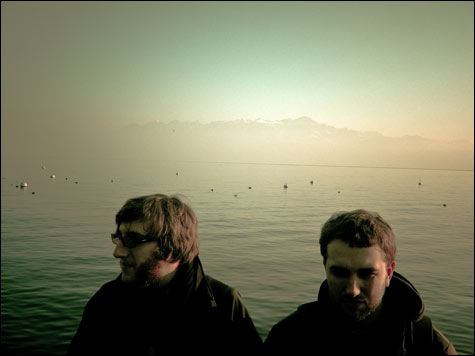
UNPLUGGED "We've only had a few small glitches," says Mirza Ramic (right, with Max Lewis). "Well, one time the power went out at a show in Florida, but there's nothing we could do about that." |
I've never trusted music that's too engineered, too perfect. Headphones on the drummer and a hundred tracks running off a laptop? Most bands practice and practice to get things just right, but it's that threat of the unexpected that makes a show worth seeing. Live at Folsom, Krist Novoselic clocking himself with his own bass, the Russian roulette you play any time you go to see a friend's new band — surprise and disaster can strike at any time. And oh, how our lizard brains crave those moments.
The digitally enhanced duo Arms and Sleepers — Max Lewis from Boston and Mirza Ramic from Portland, Maine — don't make it that easy. You pretty much know what you're getting into at one of their shows: syrupy slow jams with jittery, atmospheric backdrops played along to big, abstract video projections. Melodies wander in and out, but they do so like clockwork. You're seeing essentially the same thing every time; it drifts by unchanged, like a ride at Epcot. It works every time too, and there's little room for error. But when the music is this good, I don't think I even mind.
"We always think ahead and have back-up plans at our shows," says Ramic over a Gchat connection as the band are en route to a date in Norfolk, Virginia. "Thus far we've only had a few small glitches. Well, one time the power went out at a show in Florida, but there's nothing we could do about that."
Arms and Sleepers pull into the Middle East upstairs this Wednesday to celebrate the release of their majestic new album, The Matador (Expect Candy). They're spending nearly five months on the road this year, and their spurts of free time have been spent in their Malden home studio. As it turns out, all the high-wire stuff goes on behind the scenes — a scattershot recording process that's as open to chance and unexplored territory as anything else you'll get into this year.
"This album was the first time we used so much acoustic stuff on record, some for the first time," says Lewis, who's the principal programmer. The evolution has been a slow one, but alert listeners will notice a subtle shift in the sonic make-up on The Matador. There's more guitar, more voice, more bells, and, overall, more organization. The stately, impressionistic Sigur Rós feel is still there (and unapologetically so), but there are moments of genuine songishness — especially on the breathless duet "The Arkitecht" and the pin-prick-numb "Twenty-Nine Palms."
This time around, the duo also adopted a more liberal approach to guest collaborations. Over the summer, they e-mailed tracks they'd been tinkering with — with no instructions — to a bundle of friends who included Travels' Mona Elliott, Ben Shepard and Catherine Worsham from Uzi & Ari, Philip Jamieson from Caspian, and Adam Arrigo from the Main Drag.